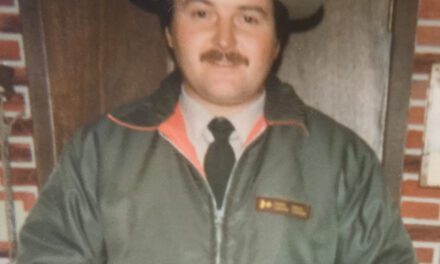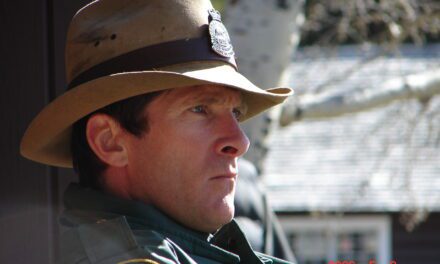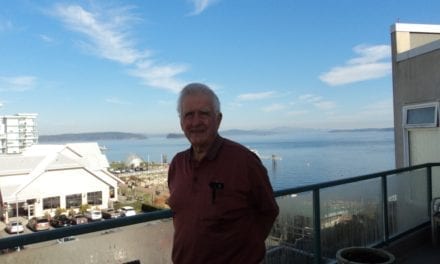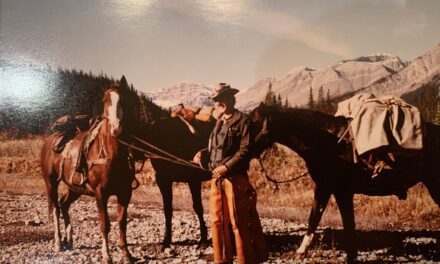- (37:21) Oh, a hundred! Hans Fuhrer and myself, he kind of got me into climbing in Kootenay. We did a number of first ascents of peaks in Kootenay National Park. I am thinking five or six. Hans was a very cautious climber. We never did the most difficult route to some of these peaks. He just wanted to get to the peak and say that he had done it. He was quite a character. Peter Whyte and Neil Woledge. Neil Woledge was my very first chief park warden. I don’t know if you want to use this one, Gordie Watkins and I were out at Kootenay Crossing and Neil paid a visit. This was my first year, it was in the fall and there were elk all over the place. Neil had a coffee or something with us and he just looked and he said, “You boys are damn fools, if your freezer ain’t full of elk!” Because that was the way it was eh? The early wardens, didn’t get paid, they lived off the land! Then who the heck else…well, Loewen, he is a character in himself too. Johnny Nylund, the horseman in Banff. Larry Gilmar and Johnny Wackerle, they were the generation just ahead of me. Jay Morton. Jay Morton was one of the first wardens to come in with a degree. I had a lot to learn from all of those guys…Well hey, your dad, Keith too. Perry Jacobson, just a ton of knowledge. It was great. Then I went to Prince Albert and their names escape me right now, but they had been there for years too…
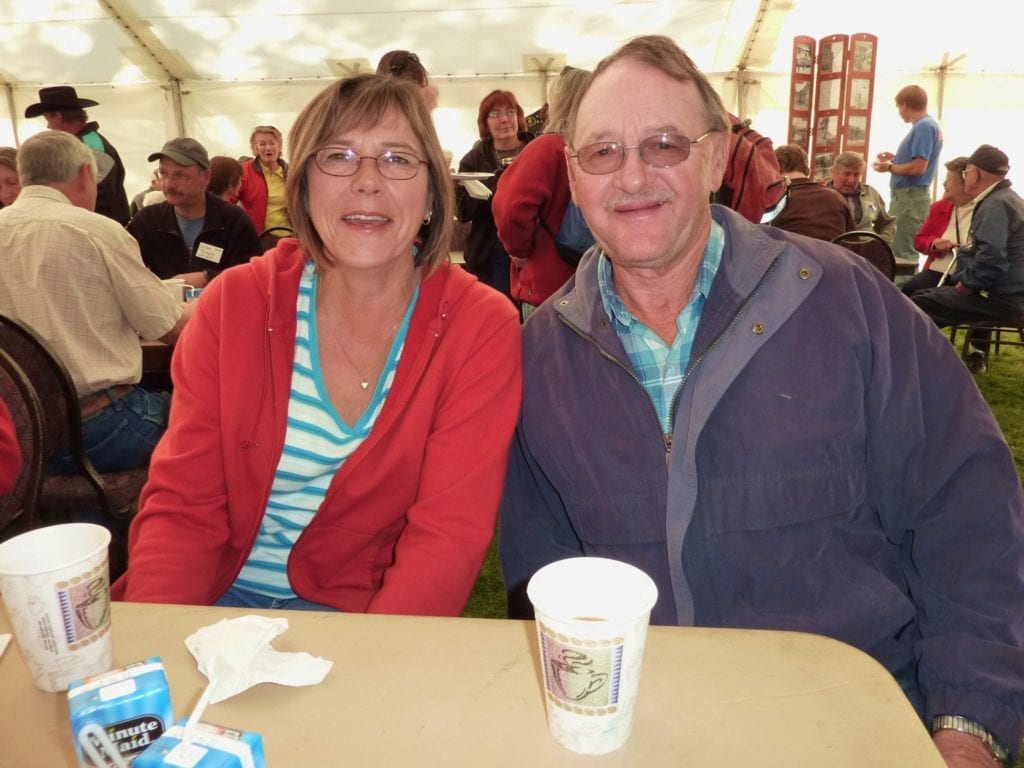
Debbie & Bill Browne at the 2009 Warden Centennial Celebration in Banff. Photo by Edwin Knox.
“Is there anything about the warden service as you knew it that you would want future generations to know?”
- (41:10) I don’t know if it is applicable, but I would say to the warden service of the future, “Be a warden service.” Right now my understanding is that you are only a warden if you have the law enforcement ticket. Forget that nonsense! Be the warden service, you are part of Parks Canada. If they are never going to go back to the old ways and they’ve got to go like the American parks are, that you are a park ranger, it doesn’t matter if you are an interpreter or whatever. You got to be a family. You’ve got to all work together and that is what is important, to remember that Parks Canada is an institution and you are a member of that thing and so are a whole bunch of other people. When you have these goals that you’ve all got to strive for, you can’t be separating yourself out from it, and you’ve got to believe in what you are doing. I think that anybody that ever gets into Parks Canada is believing what they are getting into, but unfortunately it is so fragmented that you probably don’t understand what half the other people are doing in there.
“Would you say that being a family was what made it such a unique organization?”
- (42:51) Oh, totally… You were a family in Kootenay, a family in Banff, a family in Lake Louise, but not only that, you went to a regional or a national school and you were a family with people in Kejimkujik, you were a family with somebody in Point Peele. You were a brotherhood, it was spectacular!
“Any lasting memories of your time as a warden?
- (43:43) Oh man, there were so many. A favorite place or a favorite cabin?”) Obviously the most favorite time I had was when I was out in the Windy district, Scotch Camp and Dormer, working the boundaries and that. It was basically only you, the wildlife and the hunters on the boundary. It was spectacular for sure. That’s probably my most favorite memory, but the training we got, I was just looking today I pulled out some papers I had, it was an unbelievable amount of training that Parks gave you at that time. The opportunities to travel here and there, it was special.
- (45:01) Oh, absolutely, but like I said once I got into management and I got kind of wrapped up in having to choose whether (I was with management or the wardens), even though I am a chief park warden I am being told that I have to follow the management rules, especially with issues like arming. How can you support the people you are supervising and still support the management when the two are in conflict there? That was tough…that was real tough for me. Then again, all of a sudden and it is my own fault because I went into management…you are not out in the field anymore, you are not connected with the guys the way you should be and you are behind the desk for most of the time. Even then you keep telling yourself that you’ve got to get out to do something and you do it once in a while, but once in a while is not enough. You end up finding that you are behind that desk about 80% of the time, or 85% of the time and being out there just making token appearances as the Chief Warden, I don’t think cut it…
“What do you in retirement now, what do you like to do to keep busy?”
- (46: 54) We have a small little landscaping business that we spend about four months doing, but only two days a week, my wife and myself. We spend a month traveling through the States with a fifth wheel and three months in Mexico without the fifth wheel, then we come back and get the fifth wheel in the States and then spend another month coming home. It’s been absolutely perfect!
Pages: 1 2
